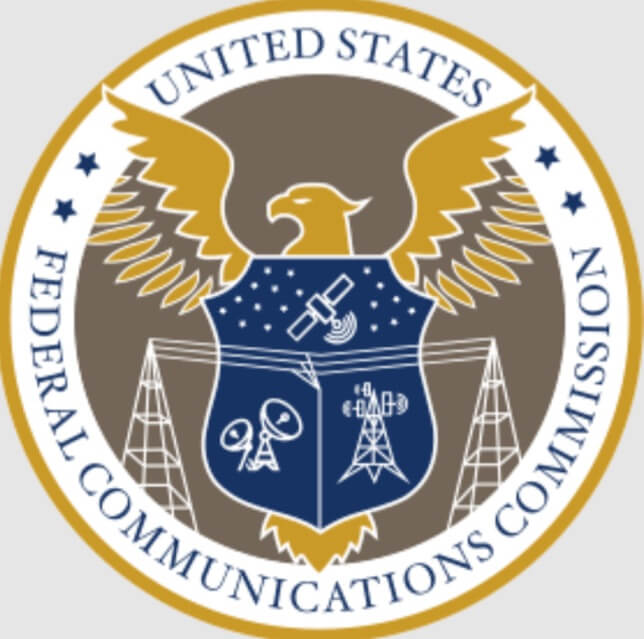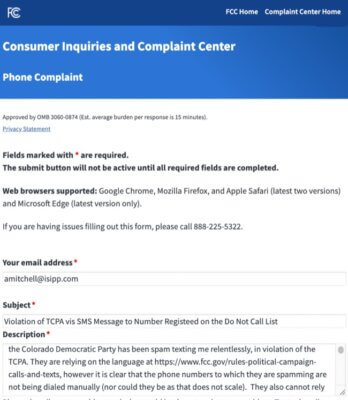
Here’s how to report political spam text messages and get them where it hurts. Some will tell you that how to report text message spam from political campaigns is to simply report it to your mobile provider, but the real way, the way to have an impact, the way with teeth, is to report political spam text messages to the FCC (Federal Communications Commission), and it’s easy with the FCC’s online form. You just need to know where it is and what to say.
Now, of course, you can also report political text message spam to your mobile carrier, most mobile providers have a special 4-digit number you can punch in when you receive text message spam to report the spam back to them. (Go here to read how.) But that really doesn’t do anything other than to block that particular number from texting you again, it doesn’t actually make them stop. Especially when you are talking about a political campaign.
Why Political Campaigns Think They Can Get Away with It
The issue of whether an organization can send you a text message is pretty straight-forward. If they have your consent to send you text messages, they can. If they don’t have your consent, they can’t. And if you have registered your phone number on the Federal “Do Not Call” registry, they really can’t, as under the Federal Telephone Consumer Protection Act, also known as the TCPA, there are fines for contacting a phone that is registered on the national Do Not Call registry.
The FCC has very clearly stated that the TCPA applies to SMS text messages as well as to telephone calls. In a ruling available here the FCC explains that “The TCPA’s consent requirement applies to short message service text messages (“SMS” or “text message”) in addition to voice calls,” and in the same ruling they say that “(requestor Glide Talk) raises the issue of whether SMS text messages are subject to the same consumer protections under the TCPA as voice calls. We reiterate that they are.”
So that dispenses with any question as to whether SMS text messages are subject to the same rules as telemarketing phone calls under the TCPA. They are; in fact text messages to mobile phones are treated exactly like marketing phone calls to mobile phones under the law. And that means that in order to send you a text message they need your consent. And if your phone is registered on the Federal Do Not Call registry and they text message you without your consent, then not only did they violate the law, but the TCPA says that they have to pay a fine of up to $1500 per message, and the person they have to pay it to is you. But you have to know how to make them pay (for that see this excellent “Make Text Spammers Pay You” kit from sister organization the Institute for Social Internet Public Policy).
The Internet Patrol is completely free, and reader-supported. Your tips via CashApp, Venmo, or Paypal are appreciated! Receipts will come from ISIPP.
But What About Political Text Messages?
Now that we have dispensed with the question of whether text messages are required to comply with the TCPA (they are) we turn to the question of political text messages specifically. Here’s what the FCC has to say about that. In a rule issued in 2020, the FCC says that “Robotexts, text messages generated through autodialing, are also considered a type of call and fall under all robocall rules.” They then go on to say that:
As text messages generally go to mobile phones, robotexts require the called party’s prior express consent. However, political text messages can be sent without the intended recipient’s prior consent if the message’s sender does not use autodialing technology to send such texts and instead manually dials them.
{Emphasis ours}
Now, the reason that political campaigns think that they can get away with spamming you is because 1) they are relying on you not knowing any of this, and 2) even if you know it they are relying on you not knowing whether or not they are using an autodialer rather than manually punching your number in, and 3) they are relying on how they are doing it falling within the very vague and ambiguous “not using autodialing technology”, and hey, if it’s ambiguous that seems like a big loophole. Finally, they are also relying on a 2021 Supreme Court decision called Facebook versus Duguid, in which the Supreme Court held that Facebook did not violate the TCPA when they sent text messages to a registered user notifying him of login attempts. This is a completely different situation, of course, but spammers have to grasp at whatever they can. In addition, the Supreme Court’s holding was, and only was, that in order to fall under the requirements of the TCPA, a “necessary feature of an autodialer… is the capacity to use a random or sequential number generator to either store or produce phone numbers to be called.”
Note that the system only has to have the capacity to use a number generator, it doesn’t say that it needs to be used. In addition, the case was simply remanded to the lower court, and there has been no further decision on that case from the lower court. Moreover, there have been lots of decisions in other lower courts based on Duguid, and they are all over the place, some would favor the spammers, but others do not.
Anyways, the point is, the spammers are relying on you having no bleeping idea just how they are sending these text messages, let alone how to report them, because you don’t know whether they are manually entering your phone number in order to text you or not.
But c’mon, really? Is it really possible that they have so many people working for them that they can hand-enter telephone numbers, one at a time, and manually text message them? Of course not. It simply doesn’t scale.
So, report them.
How to Report Political Text Message Spam to the FCC
It’s actually really easy to report each and every political text message spam that you receive to the FCC. In fact, they encourage it on that very same page where they talk about political text messages, saying:
If you think you’ve received a political robocall or text that does not comply with the FCC’s rules, you can file an informal complaint with the FCC at fcc.gov/complaints.
But we’re not just going to send you over to the form, we’re going to tell you what to say! Although put it in your own words. Here is what the CEO of the Institute for Social Internet Public Policy, who is an Internet public policy lawyer, put when she filled out the form herself:
Hello, my phone number has been registered on the Do Not Call list for years. Despite that, the Colorado Democratic Party has been spam texting me relentlessly, in violation of the TCPA. They are relying on the language at https://www.fcc.gov/rules-political-campaign-calls-and-texts, however it is clear that the phone numbers to which they are spamming are not being dialed manually (nor could they be as that does not scale). They also cannot rely on the language in Duguid, which only talks about language construction, and capacity (not whether that capacity is used), with regards to messages to registered users. This is a serious problem affecting millions of citizens. Please make it stop.
Ready? Go here to file your complaint about political text message spam.
The Internet Patrol is completely free, and reader-supported. Your tips via CashApp, Venmo, or Paypal are appreciated! Receipts will come from ISIPP.










